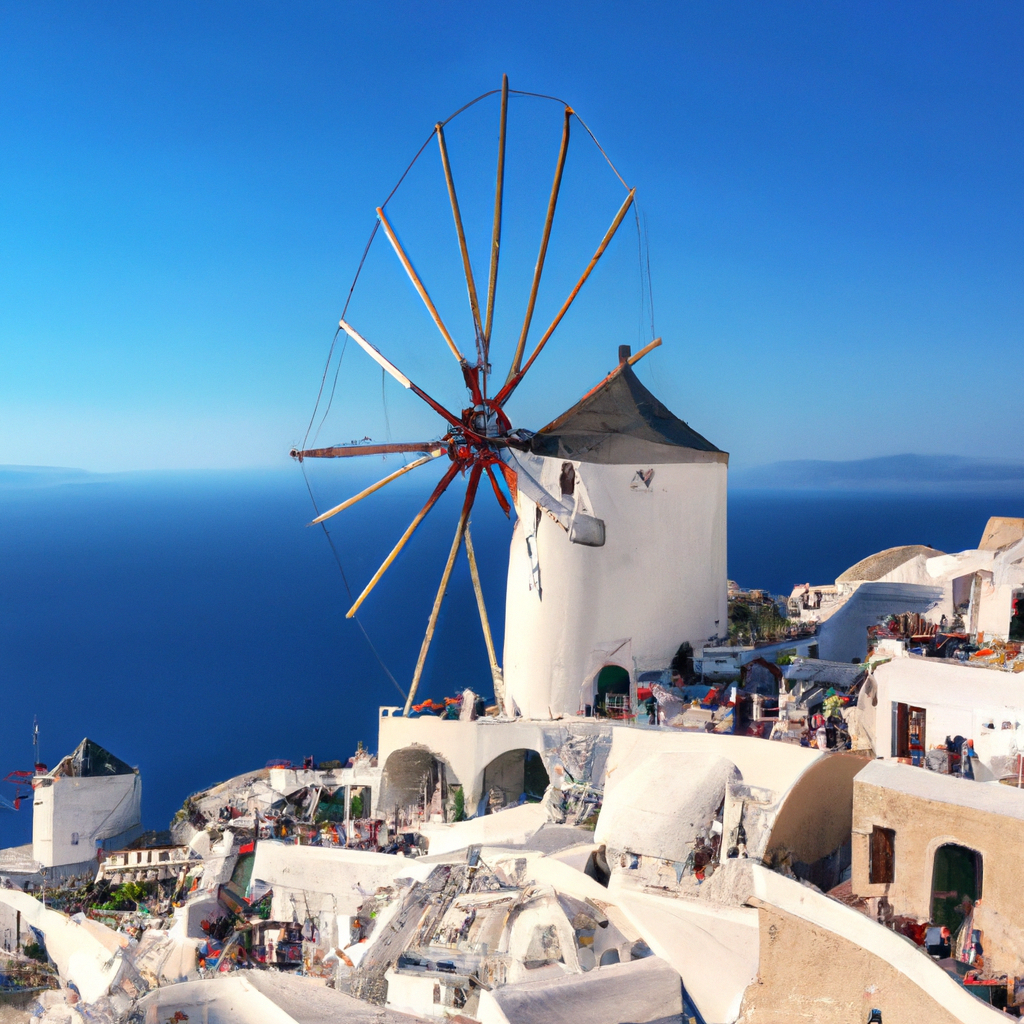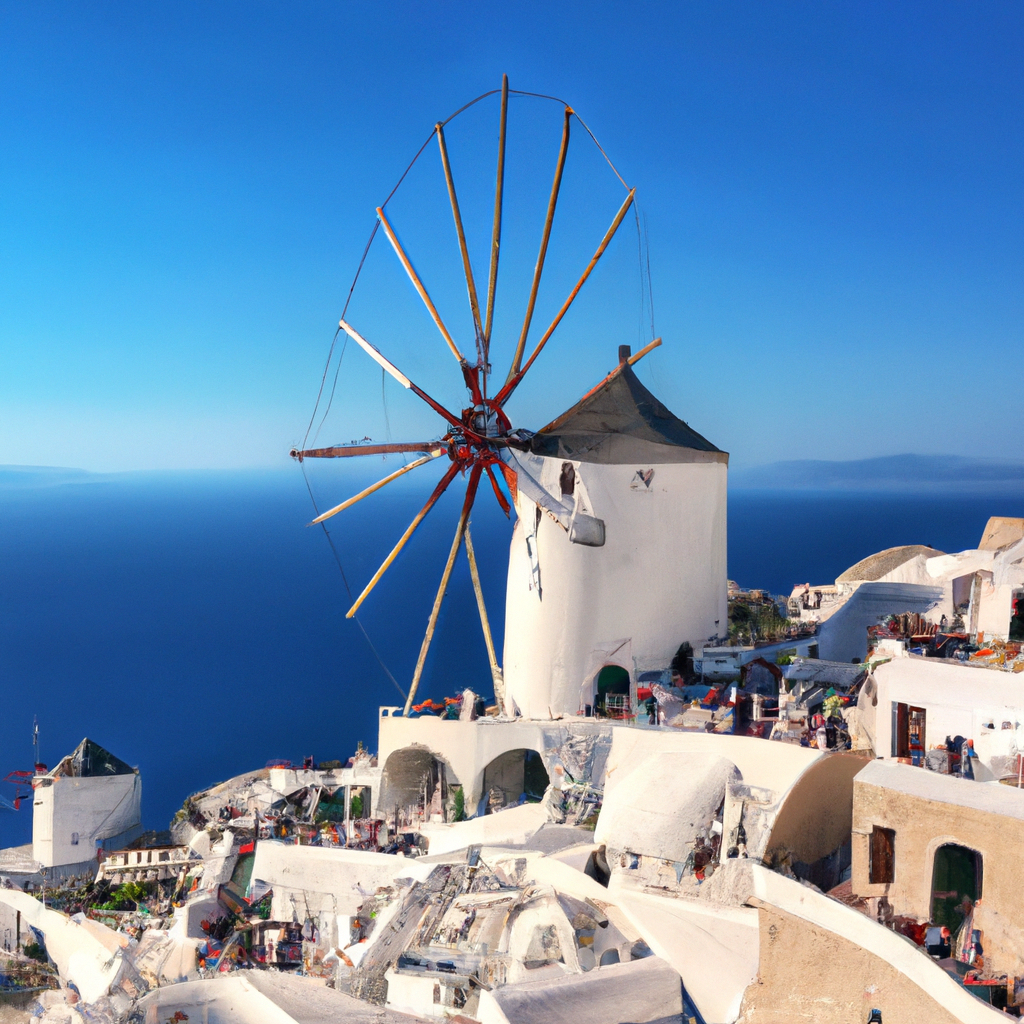Embark on a journey like no other as you delve into the breathtaking beauty and sustainable wonders of the Greek Islands. From the crystal-clear waters of Crete to the lush green landscapes of Corfu, these enchanting islands offer a unique experience for eco-conscious travelers. Immerse yourself in the rich cultural heritage, indulge in delicious local cuisine, and witness firsthand the efforts made towards preserving and protecting the natural environment. Get ready to be captivated by the eco-friendly measures and initiatives that make the Greek Islands an ideal destination for those seeking a sustainable and unforgettable travel experience.

Sustainable Transportation Options for Island Hopping
When it comes to exploring the Greek Islands, there are several sustainable transportation options that not only allow you to conveniently move from one island to another but also help minimize your carbon footprint. One popular and eco-friendly choice is ferry and boat services. These services not only provide a scenic and enjoyable experience but are also much more sustainable compared to other modes of transportation. By opting for ferry and boat services, you contribute to reducing air pollution and congestion on the islands.
In addition to ferries and boats, cycling and walking tours are another fantastic way to explore the islands sustainably. Many of the Greek Islands offer picturesque landscapes and stunning coastal views, making them ideal for cycling and walking adventures. These tours not only help you immerse yourself in the local culture and natural beauty but also have minimal impact on the environment. Plus, they offer great opportunities for exercise and adventure, all while reducing your carbon footprint.
If cycling and walking aren’t your preferred means of transportation, there are also public transportation options available on the islands. From buses to trams, public transportation systems are an excellent way to navigate through the islands sustainably. They help reduce traffic congestion and emissions, ensuring a cleaner and greener environment for both locals and tourists. Besides, public transportation allows you to engage more closely with the local community and experience the island’s vibrant culture and atmosphere.
Preserving Nature and Wildlife on the Islands
The Greek Islands are home to diverse and unique ecosystems, and it is crucial to protect and preserve these natural wonders. National parks and protected areas play a significant role in conserving the islands’ ecosystems and biodiversity. These areas serve as havens for various plant and animal species and provide a safe space for their habitats to thrive. By visiting and supporting national parks and protected areas, you contribute to their maintenance and restoration, ensuring that future generations can also enjoy the beauty and richness of these natural environments.
Conservation efforts for endangered species are another essential aspect of preserving nature and wildlife on the islands. Many species on the Greek Islands, such as the Mediterranean monk seal and loggerhead sea turtle, are endangered and require significant conservation efforts to ensure their survival. Organizations and initiatives dedicated to protecting and rehabilitating these species play a vital role in their recovery. By supporting these efforts, you actively contribute to safeguarding the islands’ unique wildlife and promoting sustainable and responsible tourism.
Furthermore, guided wildlife tours offer an incredible opportunity to learn about and appreciate the diverse wildlife on the Greek Islands. These tours are led by knowledgeable guides who are passionate about conservation and provide valuable insights into the islands’ ecosystems and the species that inhabit them. Engaging in guided wildlife tours not only enhances your understanding of the local flora and fauna but also generates support for the conservation efforts that protect and preserve these precious ecosystems.
Promoting Sustainable Agriculture and Farming
The Greek Islands boast a rich agricultural heritage, and promoting sustainable agriculture and farming practices is key to preserving this cultural and economic legacy. Organic farms and local produce are excellent examples of sustainable agriculture in the islands. These farms prioritize environmentally friendly practices such as using natural fertilizers and avoiding harmful pesticides, ensuring that the produce is healthy and free from harmful chemicals. By choosing to support organic farms and consume local produce, you contribute to the conservation of soil health, water resources, and overall ecosystem well-being.
Traditional farming practices also play a significant role in promoting sustainable agriculture on the Greek Islands. These practices have been passed down through generations, utilizing local knowledge and techniques that are well-suited to the islands’ unique landscapes and climate. Traditional farming techniques often involve crop rotation, water conservation methods, and the preservation of heirloom seeds. By supporting farmers who embrace these traditional practices, you help preserve the islands’ cultural heritage and promote sustainable agricultural methods that are in harmony with the environment.
For those who want a firsthand experience of sustainable agriculture, farm-to-table experiences offer a fantastic opportunity. These experiences allow you to visit local farms, participate in farming activities, and even enjoy freshly harvested meals made from organic and locally sourced ingredients. Farm-to-table experiences not only connect you with the islands’ agricultural traditions but also foster a deep appreciation for sustainable farming practices and the importance of consuming locally grown food.
Efforts in Waste Management and Recycling
As responsible travelers, it is crucial to be mindful of waste management and recycling practices on the Greek Islands. Many islands have implemented recycling programs and initiatives to effectively manage waste and reduce its impact on the environment. By actively participating in these programs, such as separating recyclables from general waste and using designated recycling bins, you contribute to the islands’ efforts in sustainable waste management.
In addition to recycling, reducing single-use plastics is a vital step towards reducing waste and protecting the islands’ fragile ecosystems. Many businesses and establishments on the Greek Islands have switched to eco-friendly alternatives, such as biodegradable or reusable packaging. As a responsible traveler, you can also play your part by carrying a reusable water bottle, using cloth shopping bags, and avoiding single-use plastic items wherever possible. Small changes like these can collectively make a significant difference in minimizing plastic pollution and preserving the natural beauty of the islands.
Composting and waste reduction are also crucial aspects of sustainable waste management. Many accommodations and restaurants on the Greek Islands have implemented composting systems, allowing organic waste to be repurposed as nutrient-rich soil for plants. By supporting establishments that prioritize composting and waste reduction, you contribute to a circular economy and help reduce the islands’ overall waste footprint.

Eco-Friendly Accommodation Options
Choosing eco-friendly accommodation is a significant step towards responsible and sustainable travel in the Greek Islands. Green hotels and eco-lodges are leading the way in providing environmentally conscious lodging options. These establishments prioritize sustainability by implementing energy-efficient practices, utilizing renewable energy sources, and minimizing water consumption. By staying at green hotels and eco-lodges, you can enjoy your vacation while knowing that you are minimizing your impact on the environment.
If you prefer a more authentic and immersive experience, traditional guesthouses and homestays are an excellent choice. These accommodations are often family-run and offer a unique opportunity to experience the local culture and hospitality. Traditional guesthouses and homestays typically incorporate sustainable practices, such as locally sourced materials and energy-saving measures. By supporting these accommodations, you not only contribute to the local economy but also promote sustainable and responsible tourism practices.
For those looking for a truly off-grid experience, sustainable living options are available on some of the Greek Islands. These options may include eco-friendly huts, yurts, or other alternative accommodations that prioritize minimal environmental impact. Staying in these off-grid accommodations allows you to disconnect from the hustle and bustle of modern life while appreciating the simplicity and beauty of sustainable living.
Exploring Renewable Energy Initiatives
The Greek Islands have been making significant progress in adopting renewable energy sources and reducing dependency on fossil fuels. Solar and wind energy projects are increasingly becoming a common sight on many islands. Solar panels can be seen adorning rooftops, and wind turbines gracefully harness the power of the Aegean breeze. By exploring these renewable energy initiatives, you can witness firsthand the islands’ commitment to a clean and sustainable energy future.
Geothermal energy utilization is another exciting initiative taking place on some of the Greek Islands. With volcanic activity beneath the surface, these islands have a unique opportunity to tap into the Earth’s natural heat for energy production. Geothermal energy not only reduces reliance on non-renewable resources but also has a minimal impact on the environment. By learning about and supporting geothermal energy projects, you contribute to the islands’ sustainable energy transition.
Clean energy infrastructure, such as electric vehicle charging stations, is also becoming more prevalent on the Greek Islands. The infrastructure supports the adoption of electric vehicles, reducing emissions and air pollution. By utilizing clean energy infrastructure during your travels, you contribute to the islands’ efforts in creating a sustainable and environmentally friendly transportation network.
Protecting Coastal and Marine Ecosystems
The stunning coastal and marine ecosystems of the Greek Islands are a significant draw for tourists. It is essential to protect and preserve these delicate ecosystems to ensure their long-term viability. Marine protected areas and reserves are designated zones that restrict human activity, allowing marine life and habitats to thrive without interference. By respecting the boundaries of these protected areas and supporting their establishment and maintenance, you contribute to the preservation of the islands’ marine biodiversity and the overall health of the marine ecosystems.
Beach clean-up initiatives are a fantastic way to actively participate in protecting the coastal and marine environments of the Greek Islands. Many organizations and local communities organize regular clean-up activities, where volunteers gather and remove litter from beaches and shorelines. By joining these initiatives, you contribute to reducing marine pollution and ensuring that the pristine beauty of the islands’ beaches can be enjoyed by both locals and future generations of visitors.
Supporting sustainable fishing practices is also crucial in protecting coastal and marine ecosystems. Overfishing and destructive fishing practices can have severe consequences for marine life and the overall health of the oceans. By choosing to consume sustainably sourced seafood and supporting local fishermen who adhere to sustainable fishing methods, you help protect the islands’ marine ecosystems and ensure a more sustainable future for the fishing communities that rely on these resources.
Engaging with Local Communities and Culture
During your visit to the Greek Islands, it is essential to engage with local communities and celebrate their unique culture and heritage. Community-based tourism initiatives offer opportunities to interact directly with local residents, fostering meaningful connections and cultural understanding. These initiatives often involve homestays, guided tours led by locals, or cultural exchanges, allowing you to experience the islands’ vibrant culture and traditional way of life firsthand. By engaging with local communities, you gain a deeper appreciation for the islands’ customs and traditions while supporting their economic development.
Traditional crafts and cultural events are an integral part of the Greek Islands’ identity and offer a window into the islands’ rich heritage. From pottery and weaving to traditional music and dance, the islands are brimming with artistic expressions that have been passed down through generations. By supporting local artisans and attending cultural events, you contribute to preserving these traditional crafts and ensuring their continued practice. It is also an opportunity to take home unique and authentic souvenirs that directly support the local economy.
Supporting local economies is a crucial aspect of responsible travel. By choosing local businesses, markets, and restaurants, you help stimulate the islands’ economies and ensure that the benefits of tourism are shared among the local population. Tasting local cuisine, shopping at local markets, and staying at locally owned accommodations all contribute to creating a sustainable, community-centered tourism industry that celebrates the islands’ culture and supports livelihoods.
Educational and Volunteer Opportunities
For those seeking a deeper understanding of the islands’ ecosystems and conservation efforts, educational programs and volunteer opportunities provide valuable hands-on experiences. Environmental education programs are offered by various organizations and institutions, where participants can learn about the islands’ unique ecosystems, wildlife, and sustainable practices. These programs often include guided nature walks, workshops, and lectures conducted by experts in the field. By participating in these educational programs, you gain a deeper understanding of the challenges faced by the islands and become better equipped to contribute to their conservation.
Volunteering in conservation projects is another meaningful way to make a positive impact on the Greek Islands’ environment. Many organizations offer volunteering opportunities, where you can actively participate in conservation activities such as habitat restoration, wildlife monitoring, and beach clean-ups. By volunteering your time and skills, you directly contribute to the preservation and restoration of the islands’ natural habitats and biodiversity, leaving a lasting positive impact on the environment.
Joining eco-campaigns and workshops is yet another way to engage with like-minded individuals and contribute to sustainability efforts on the Greek Islands. These campaigns and workshops often focus on raising awareness about environmental issues, promoting sustainable practices, and advocating for responsible tourism. By actively participating in these initiatives, you become an advocate for sustainable travel and inspire others to make conscious choices that benefit the islands’ ecosystems and communities.
Important Considerations for Responsible Travel
While enjoying your time in the Greek Islands, it is crucial to be mindful of certain principles and practices that embody responsible travel. Respecting local customs and traditions is of utmost importance, as it helps foster mutual respect and cultural understanding. Take the time to learn about the islands’ customs and etiquette, and always be respectful when visiting religious sites or participating in cultural events. By respecting the traditions and values of the local communities, you become a responsible traveler who contributes positively to the islands’ social fabric.
Being mindful of resource usage is another essential consideration. The Greek Islands, like many other tourist destinations, face challenges related to water scarcity and energy consumption. Be conscious of your water usage, especially in regions where water resources may be limited, and make an effort to conserve energy by turning off lights and air conditioning when not needed. Small actions like these can significantly contribute to minimizing your environmental impact and preserving the islands’ resources for future generations.
Supporting ethical tourism practices is a fundamental aspect of responsible travel. Ensure that any activities or tours you participate in align with ethical and sustainable standards. Avoid supporting activities that exploit animals or harm the environment. Instead, opt for attractions and experiences that promote conservation, education, and local engagement. By making informed choices and supporting responsible tourism, you contribute to the islands’ sustainable development and help create a positive and lasting impact on both the environment and local communities.
